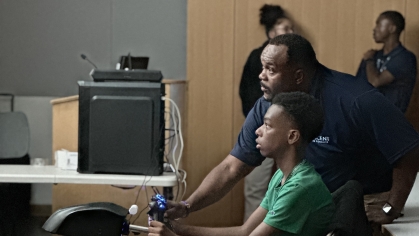More Math, Please!
Rutgers University Professor’s Research Finds Innovative Ways to Improve Achievements in Mathematics for Newark Students in Grades K-8
In the world of mathematics education, less is not necessarily more. According to results of a recent study, children in grades K-8 learn more when allowed to do more; more complex and conceptually challenging mathematics, that is, as opposed to focusing exclusively on solving routine, computational and memorization type problems. At least that’s the finding of research conducted by Dr. Roberta Schorr, associate professor of the Department of Urban Education, Faculty of Arts and Sciences, at Rutgers University in Newark, and co-principal investigator of the Newark Public Schools Systemic Initiative in Mathematics (NPSSIM) project.
With students’ overall improved learning of and achievement in mathematics as her ultimate goal, Schorr has been a crusader for comprehensive reform in mathematics in the Newark Public Schools district. Through her efforts with NPSSIM and MATHNext, Schorr has been successful in achieving significant advances in the learning and teaching of mathematics and the development of complex math ideas in students. “NPSSIM and MATHNext are exemplary programs created to elevate mathematics achievement,” says Schorr.
NPSSIM was initiated in 2002 with a grant of more than $6 million from the National Science Foundation. It was a six-year, multifaceted program that utilized an informed group of Rutgers University faculty, Newark Public Schools district and instructional leaders to implement and institutionalize standards-based curricula, standards-based instruction, and assessment practices. NPSSIM also included professional development for Newark Public Schools administrators and teachers. The results – Newark students’ proficiency in fourth grade mathematics increased by 33.4% and their advanced proficiency in fourth grade mathematics increased by 19.7% (7.6% in 2002 to 27.3% in 2007). Compared to language arts, fourth graders’ mean passing scores in mathematics increased with each succeeding year from 2002-2007, going from 35.7% in 2002 to 69.1% in 2007 (+33.4% in mathematics). Whereas, fourth graders’ mean passing scores in language arts have not changed significantly from 2002-2007, going from 57.9% in 2002 to 59.5% in 2007 (+1.6% in language arts).
“These are impressive results for NPSSIM,” says Dr. Schorr. “Prior to the implementation of NPSSIM, approximately 85% of Newark students were classified as incompetent or minimally competent in mathematics. With a focus on developing complex math ideas, NPSSIM allows students to learn how to solve complex problems and deal with frustration and anxiety productively so that these feelings lead to anticipation of learning something new and to increased pride of achievement when an intricate math problem is solved.”
NPSSIM continues to get credit for having made profound changes in mathematics education within the Newark Public Schools. Schorr believes a successful mathematics education program is one that provides support to all stakeholders: students; parents; educators and administrators. “With NPSSIM, no one is left out or behind,” says Schorr.
MATHNext, on the other hand, focuses on providing professional development and creating a support network for New Jersey educators who teach math to middle grade students. It is a project that encourages the development of complex mathematical ideas in students through a “community” of practice involving Rutgers faculty, researchers, teachers, coaches and supervisors. As part of this virtual community, the participants examine mathematical content, curriculum, pedagogy and affect. “MATHNext has been described as an educational melting pot in which participants can develop friendships and associations with other like-minded colleagues across the state who share similar interests regarding advancements in the teaching and learning of mathematics,” says Schorr. Currently, 20 school districts, representing 10 counties, participate in the program.
With funding from the New Jersey Department of Education and collaborative support from Rutgers University in Newark and the Business Coalition for Educational Excellence at the New Jersey Chamber of Commerce, MATHNext uses advances in communication technology to enable participants to attend scheduled professional development sessions from remote locations. “Education via webinars reduces transportation costs and increases participation of individuals who might otherwise be deterred by distance,” says Lisa Warner, senior mathematics education specialist/research analyst in the Department of Urban Education at Rutgers University in Newark and associate program director of MATHNext and NPSSIM.
By all accounts, programs like NPSSIM and MATHNext are win-wins for everyone – most especially, the students.
Contact: Ferlanda Fox Nixon
973-353-5262
E-mail: ferlanda@andromeda.rutgers.edu

